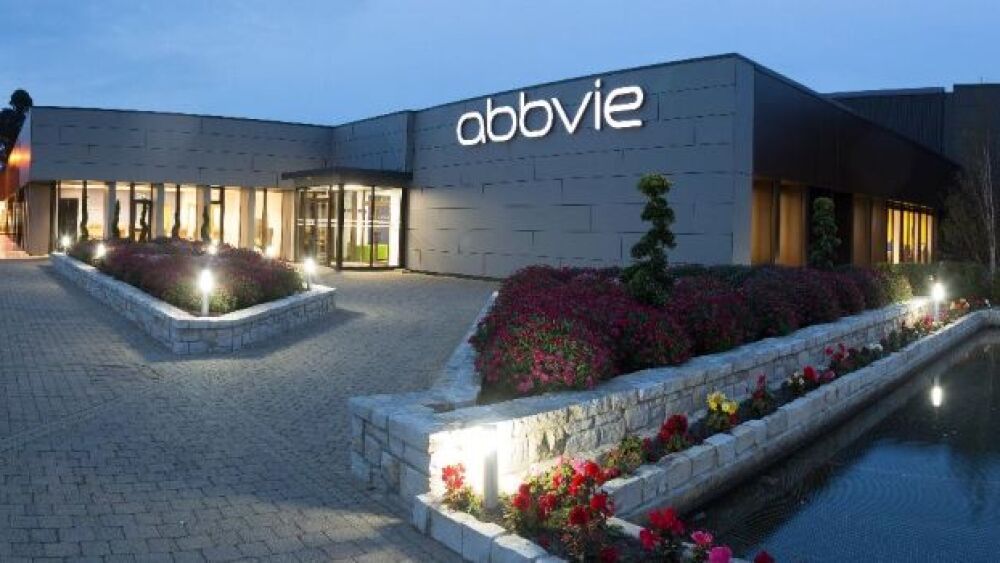While reporting stellar third-quarter financials, AbbVie announced it was halting development of cedirogant and provided updates on Skyrizi, Rinvoq and Humira.
Courtesy of AbbVie Inc.
While reporting positive third-quarter financials, AbbVie announced it is halting the development of cedirogant (ABBV-157), while also providing updates on Skyrizi, Rinvoq and Humira.
Cedirogant is an oral RORg inverse agonist for autoimmune diseases, and more specifically, psoriasis, that was jointly discovered and developed with France’s Inventiva.
“This decision was made due to new findings observed in our preclinical chronic toxicology study,” Tom Hudson, SVP, research and development and CSO at Abbvie, said in the third-quarter conference call.
The multi-year partnership was inked between the two companies in 2012. That led to the development of cedirogant, which was being assessed in a Phase II trial up to the point of AbbVie’s decision to shutter the program.
“Although we are disappointed to see the end of cedirogant’s clinical program following the analysis of a nonclinical toxicology study, we wish to thank our partner AbbVie for 10 years of collaboration,” Frederic Cren, co-founder, chairman and CEO of Inventiva, stated.
Humira, Skyrizi and Rinvoq
Much of AbbVie’s third-quarter financials focused on the effect of biosimilar competition on its mega-blockbuster anti-inflammatory drug Humira and its efforts to eventually replace it with two drugs - Skyrizi and Rinvoq.
Global Humira net revenues were $4.449 billion for the quarter, an increase of 2.5% on a reported basis and 3.9% on an operational basis. U.S. sales rose 7.4% to hit $4.956 billion. However, internationally, net revenues dropped 25.9% to $603 million on a reported basis and 16.8% on an operational basis. The drop was due to biosimilar competition.
Skyrizi net revenues globally were $1.397 billion, rocketing 75.4% on a reported basis and 78.3% on an operational basis. Similarly, global Rinvoq net revenues were $695 million for the quarter, jumping 53.5% on a reported basis or 59.3% on an operational basis.
“Immunology once again demonstrated impressive results with Skyrizi and Rinvoq, now on pace to deliver more than $7.5 billion in combined sales this year, well ahead of our initial expectations,” Rick Gonzalez, chairman and CEO of AbbVie said in the conference call.
The two drugs are in the early launch phase for irritable bowel disease (IBD) and psoriatic arthritis (PSA), in additional to Rinvoq being developed for atopic dermatitis.
“Skyrizi and Rinvoq have established outstanding launch trajectories across existing and new indications, giving us a high degree of confidence in the collective potential of these two assets to ultimately exceed the peak revenues achieved by Humira, achieving the strategic objective we had for replacing Humira,” Gonzalez said.
Gonzalez indicated AbbVie will provide sales guidance for Humira in the fourth-quarter call, although the company appears to be predicting a continued slowing of Humira sales.
AbbVie also appeared cautious about expectations for its aesthetics portfolio, which it acquired when it bought Allergan in 2019 for $63 billion. The company reported Global Botox Therapeutic net revenues of $699 million for the quarter, up 8.2% on a reported basis, and global net revenues for the aesthetics portfolio were $1.301 billion, up 4.0%.
The company has observed slowing in treatment procedures across the aesthetics markets, “impacting the growth rates of toxins, fillers and body contouring,” Gonzalez said.
The company’s U.S. aesthetics market share is stable, but AbbVie adjusting its full-year aesthetics forecast over the near to medium term to account for the potential slowdown. Featured Jobs on BioSpace





